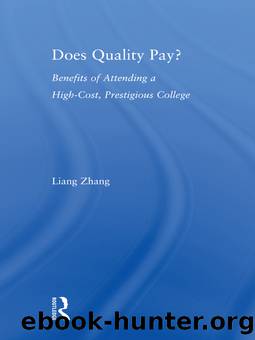Does Quality Pay? by Zhang Liang;

Author:Zhang, Liang;
Language: eng
Format: epub
Publisher: Taylor & Francis Group
Published: 2005-08-15T00:00:00+00:00
Chapter Summary
This chapter contributed to exploring the different effects of college quality across different groups of students. The equity issue discussed here was quite different from the one I studied in Chapter Three, where the equity issue related to educational attainment. The outcomes of higher education might be considered equitable if students had the same probability of earnings degrees from high-quality institutions, regardless of their demographic characteristics and socioeconomic status. Higher education was not viewed as an equitable system, from the results in Chapter Three. In Chapter Five, the equity issue spoke to the effects of educational attainment (college quality) on graduatesâ outcomes (earnings). The outcomes of higher education might be considered equitable if students with same educational attainment were able to enjoy similar advantages, regardless of their demographic characteristics or socioeconomic status. Higher education was not an equitable system, either. However, the inequity here seemed to be in favor of students from lower-and middle-class families.
I examined the interplay of the effect of college quality with six variables: gender, race/ethnicity, family income, parental education, ability, and major field of study. As far as gender was concerned, female graduates appeared to benefit less from earning degrees at high-quality colleges than did male graduates although the difference was not statistically significant. Nor was the effect of college quality uniform by race/ethnicity. Counterintuitively, graduating from high-quality colleges provided a special boost to non-White students although the effect of college quality was also substantial for White students. Examining the effect of college quality by two major parameters of socioeconomic status yielded more or less the same counter-intuitive results. The effect of college quality appeared to be larger for students from low-and middle-income families than for those from the top-income families. So too, the effect of college quality was larger for students from low-and middle-educated families than for those from highly educated families. The pattern in the effect of college quality by studentsâ ability further confirmed the above conclusion. Finally, analysis of the effect of college quality for different majors suggested that college quality might matter more for lucrative majors than for others and that college quality and college major should be considered simultaneously in deciding college choices.
Four of these six factors either directly characterized or are indirectly linked with oneâs socioeconomic status. Results from these analyses, namely, the different effect of college quality by race/ethnicity, family income, parental education, and ability suggested a pattern that was very counter-intuitive. In many ways, the results represented here do not follow the logic of critical reasoning. If college quality has a smaller effect for the more advantageous class than for the less advantageous class, why are there more upper-class students at high-quality institutions? Certainly, most researchers are skeptical, if not cynical, about results of this sort. At a recent professional conference, a presenter, who was White and clearly a critical researcher, bemoaned that some researchers found that the effect of education was greater for Black than for White students.
The social reproduction theory, which is powerful in interpreting
Download
This site does not store any files on its server. We only index and link to content provided by other sites. Please contact the content providers to delete copyright contents if any and email us, we'll remove relevant links or contents immediately.
The Art of Coaching Workbook by Elena Aguilar(51198)
Trainspotting by Irvine Welsh(21663)
Twilight of the Idols With the Antichrist and Ecce Homo by Friedrich Nietzsche(18632)
Fangirl by Rainbow Rowell(9249)
Periodization Training for Sports by Tudor Bompa(8271)
Change Your Questions, Change Your Life by Marilee Adams(7780)
This Is How You Lose Her by Junot Diaz(6886)
Asking the Right Questions: A Guide to Critical Thinking by M. Neil Browne & Stuart M. Keeley(5775)
Grit by Angela Duckworth(5614)
Red Sparrow by Jason Matthews(5471)
Paper Towns by Green John(5190)
Room 212 by Kate Stewart(5119)
Ken Follett - World without end by Ken Follett(4731)
Housekeeping by Marilynne Robinson(4446)
The Sports Rules Book by Human Kinetics(4386)
Papillon (English) by Henri Charrière(4274)
Double Down (Diary of a Wimpy Kid Book 11) by Jeff Kinney(4268)
The Motorcycle Diaries by Ernesto Che Guevara(4098)
Exercise Technique Manual for Resistance Training by National Strength & Conditioning Association(4071)
